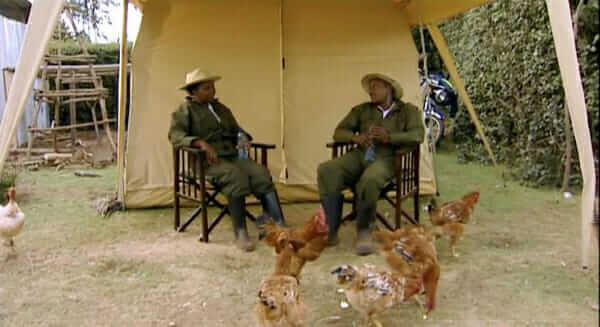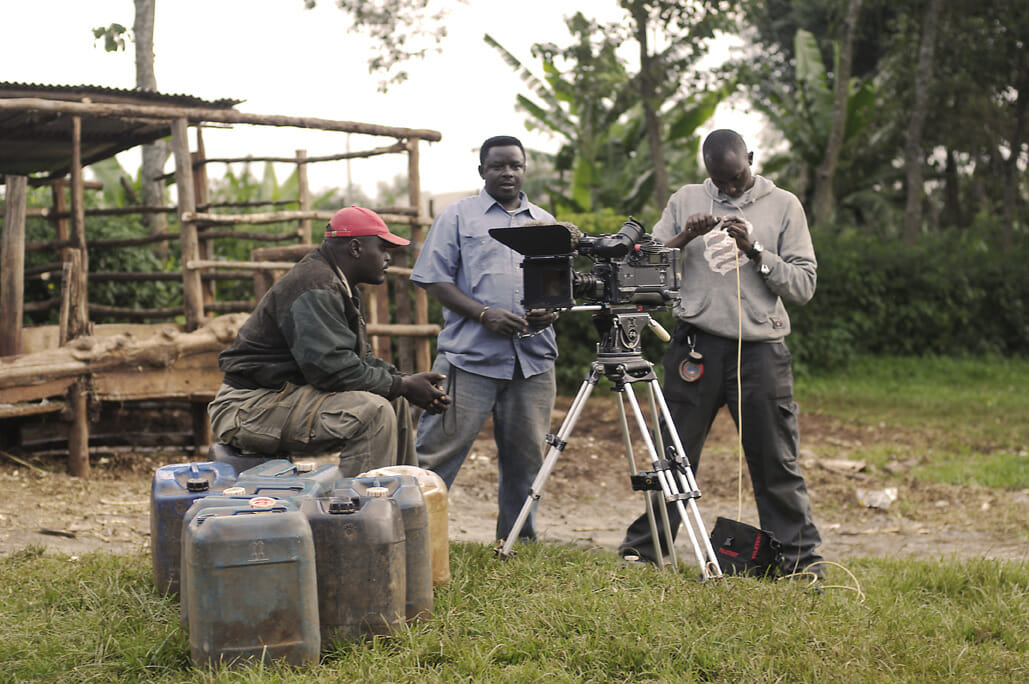Kenya’s Best and Only Reality Show for Struggling Farms
Shamba Shape Up is a wildly popular reality show, with upwards of 10 million weekly viewers across Africa. Each week, two hosts cheerily descend on a struggling farm. They look for...
Shamba Shape Up is a wildly popular reality show, with upwards of 10 million weekly viewers across Africa. Each week, two hosts cheerily descend on a struggling farm. They look for issues, tell the owners what they’re doing wrong, and give tips on how to shape up. It’s a familiar reality show format, with a key variation: everyone is nice to each other.
“In Kenya, we don’t watch TV just to see some poor guy getting yelled at,” says David Campbell, creator of Shamba Shape Up. “Culturally, we’re just more polite.”
Each week the show’s genial hosts visit a different farm (better known in Kenya as a shamba). They are highly sympathetic to each farmers’ woes, listening with warmth and compassion. Then, depending on the issues, they bring in targeted guests to give advice.
Kamau’s role on Makutano, playing a character called “Mama Vegetable,” made her the most famous actress in Kenya.
Dealing with potato blight? Try these new disease-resistant potato seeds. Cows losing their hair? They probably need deworming. Need water? Here are some rainwater harvesting tactics. The show covers any and all ag topics, like removing ticks from livestock, composting and building an apiary.
Shamba Shape Up started airing last year, but its roots are decades-old. Campbell came to Kenya in 1979, a shepherd-cum-academic who’d studied communication with semi-literate populations. He’d spent months traveling rural Africa, meeting farmers on the brink of failure.
“It wasn’t that these farmers didn’t have the land or the capacity to succeed,” Campbell said. “Mostly – and I wouldn’t call this a huge epiphany – no one was giving them information.”
His first attempt at educating farmers was a “terribly boring” radio program. For two hours, hosts would recite maize storage techniques, methods to improve soil fertility, current crop prices. The show was cancelled; Campbell regrouped.
He styled his next radio program after The Archers – the longest-running soap opera in the world. The Archers was a British show created with the UK’s Ministry of Agriculture; lessons on healthy eating and growing vegetables were embedded in the melodrama.
Campbell’s show was similar, a 15-minute program centered on farmers and the rural life. Characters included a local ag extension worker and a federal agricultural officer. There were “goodies and baddies” – some farmers tried to do things the right way, and others were lazy and greedy (a la Goofus and Gallant). Naturally, the baddies got their comeuppance, while the goodies were well-rewarded.
Fixing water collection tanks.
Kenyan women enjoy their farm kitchen makeover.

Shamba Shape Up‘s hosts, with chickens.
Learning about new maize varieties.
Co-host Tonny Njuguna does a funny dance.
Getting goofy on set.
For a time, this was the most popular radio program in Kenya. Every Sunday at 8 p.m., Campbell said virtually the entire rural population would gather around their radios to hear the latest installment.
By 2004, it was time to make the leap to TV. Previously, television sets had been too expensive for most farmers. But for $50, roughly the price of a small goat, rural Kenyans could now pick up an off-brand Chinese TV set. “Rural television viewers were the great ignored demographic,” Campbell said. “It’s the last TV sales frontier.”
Makutano Junction, the TV version of Campbell’s radio soap, is still on the air today. Eventually the lessons became less farm-specific, tackling HIV prevention and how to use electronic voting machines. Shamba Shape Up was created as the just-as-entertaining reality show that would focus on delivering ag lessons.
For $50, roughly the price of a small goat, rural Kenyans could pick up an off-brand Chinese TV set.
Shamba is hosted by Tonny Njuguna and Naomi Kamau, both Makutano Junction alums. Campbell says Kamau’s role on Makutano, playing a character called “Mama Vegetable,” made her the most famous actress in Kenya.
To keep audience attention, the hosts like to goof around – doing little dances, teasing each other, running around in the pig pen. Nobody is yelling; smiles abound.
After each episode, you can text the show’s creators and request a brochure on any topic covered. Four to six thousand brochures are now sent out each week, with numbers steadily increasing.
To maximize viewership, each episode is produced in English and Swahili. Shamba Shape Up is currently shown in three countries – Kenya, Tanzania and Uganda – but Campbell says 17 others have expressed interest. Still, no one has reached out from the developed world. Campbell suspects this may have something to do with Shamba‘s format. “It’s all very innocent,” he says. “It might not play well in the States.”
Follow us

This work is licensed under a Creative Commons Attribution-NoDerivatives 4.0 International License.
Want to republish a Modern Farmer story?
We are happy for Modern Farmer stories to be shared, and encourage you to republish our articles for your audience. When doing so, we ask that you follow these guidelines:
Please credit us and our writers
For the author byline, please use “Author Name, Modern Farmer.” At the top of our stories, if on the web, please include this text and link: “This story was originally published by Modern Farmer.”
Please make sure to include a link back to either our home page or the article URL.
At the bottom of the story, please include the following text:
“Modern Farmer is a nonprofit initiative dedicated to raising awareness and catalyzing action at the intersection of food, agriculture, and society. Read more at <link>Modern Farmer</link>.”
Use our widget
We’d like to be able to track our stories, so we ask that if you republish our content, you do so using our widget (located on the left hand side of the article). The HTML code has a built-in tracker that tells us the data and domain where the story was published, as well as view counts.
Check the image requirements
It’s your responsibility to confirm you're licensed to republish images in our articles. Some images, such as those from commercial providers, don't allow their images to be republished without permission or payment. Copyright terms are generally listed in the image caption and attribution. You are welcome to omit our images or substitute with your own. Charts and interactive graphics follow the same rules.
Don’t change too much. Or, ask us first.
Articles must be republished in their entirety. It’s okay to change references to time (“today” to “yesterday”) or location (“Iowa City, IA” to “here”). But please keep everything else the same.
If you feel strongly that a more material edit needs to be made, get in touch with us at [email protected]. We’re happy to discuss it with the original author, but we must have prior approval for changes before publication.
Special cases
Extracts. You may run the first few lines or paragraphs of the article and then say: “Read the full article at Modern Farmer” with a link back to the original article.
Quotes. You may quote authors provided you include a link back to the article URL.
Translations. These require writer approval. To inquire about translation of a Modern Farmer article, contact us at [email protected]
Signed consent / copyright release forms. These are not required, provided you are following these guidelines.
Print. Articles can be republished in print under these same rules, with the exception that you do not need to include the links.
Tag us
When sharing the story on social media, please tag us using the following: - Twitter (@ModFarm) - Facebook (@ModernFarmerMedia) - Instagram (@modfarm)
Use our content respectfully
Modern Farmer is a nonprofit and as such we share our content for free and in good faith in order to reach new audiences. Respectfully,
No selling ads against our stories. It’s okay to put our stories on pages with ads.
Don’t republish our material wholesale, or automatically; you need to select stories to be republished individually.
You have no rights to sell, license, syndicate, or otherwise represent yourself as the authorized owner of our material to any third parties. This means that you cannot actively publish or submit our work for syndication to third party platforms or apps like Apple News or Google News. We understand that publishers cannot fully control when certain third parties automatically summarize or crawl content from publishers’ own sites.
Keep in touch
We want to hear from you if you love Modern Farmer content, have a collaboration idea, or anything else to share. As a nonprofit outlet, we work in service of our community and are always open to comments, feedback, and ideas. Contact us at [email protected].by Jesse Hirsch, Modern Farmer
July 22, 2013
Modern Farmer Weekly
Solutions Hub
Innovations, ideas and inspiration. Actionable solutions for a resilient food system.
ExploreExplore other topics
Share With Us
We want to hear from Modern Farmer readers who have thoughtful commentary, actionable solutions, or helpful ideas to share.
SubmitNecessary cookies are absolutely essential for the website to function properly. This category only includes cookies that ensures basic functionalities and security features of the website. These cookies do not store any personal information.
Any cookies that may not be particularly necessary for the website to function and are used specifically to collect user personal data via analytics, ads, other embedded contents are termed as non-necessary cookies.

I wish to learn more about vertical farming business